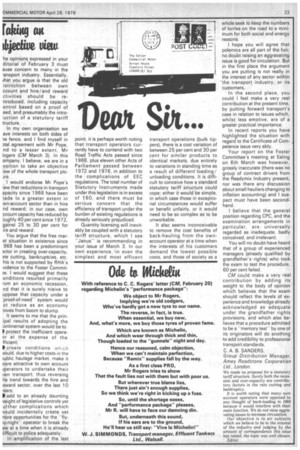rakiug ag dew
Page 25

If you've noticed an error in this article please click here to report it so we can fix it.
he opinions expressed in your ditorial of February 3 must ause concern to many in the 'ansport industry. Essentially, ihat you argue is that the old istinction between own ccount and hire/and reward ctivities should be re-itroduced, including capacity ontrol based on a proof of eed, and presumably the introuction of a statutory tariff tructure.
In my own organisation we ave interests on both sides of le fence, and I find myself in Mal agreement with Mr Pope, nd to a lesser extent, Mr logers (CM March 3). In this ompany, I believe, we are in a osition to take an objective iew of the whole transport pic
ire
I would endorse Mr Pope's iew that reductions in transport apacity since 1966 have been lade to a greater extent in wn-account sector than in hire nd reward; in our case, own ccount capacity has reduced by Dughly 40 per cent since 1972, gainst 25 to 30 per cent for ire and reward.
You argue that the free maret situation in existence since 968 has been a predominant 3ctor in creating over-capacity, ate cutting, bankruptcies, etc. his is not supported by RHA's vidence to the Foster Commit?e. I would suggest that these onditions resulted primarily ,om an economic recession, nd that it is surely maive to uppose that capacity under a 'proof-of-needsystem would ot reduce as an economy loves from boom to slump.
It seems to me that the prinipal results of adopting the :ontinental system would be to protect the inefficient operaor at the expense of the fficient
D create conditions which you'd, due to higher costs in the )ublic haulage market, make it nore attractive to own account iperators to undertake their iwn transport; thus reversing he trend towards the hire and eward sector, over the last 1 0 iears; D add to an already daunting veight of legislative controls yet urther complications which vould incidentally create yet nore opportunities for the -fly)y-nightoperator to break the aw at a time when it is already lifficult to police adequately.
In amplification of the last point, it is perhaps worth noting that transport operators currently have to contend with two Road Traffic Acts passed since 1968, plus eleven other Acts of Parliament passed between 1972 and 1976, in addition to the complications of EEC regulations. The total number of Statutory Instruments made under this legislation is in excess of 160, and there must be serious concern that the efficiency of transport under the burden of existing regulations is already seriously prejudiced.
Quantity licensing will inevitably be coupled with a statutory tariff structure, which I see "Janus" is recommending in your issue of March 3. In our own experience, in even the simplest and most efficent transport operations (bulk tippers), there is a cost variation of between 25 per cent and 30 per cent for similar products to identical markets, due entirely to variations in standing time as a result of different loading / unloading conditions. It is difficult to conceive how a standard statutory tariff structure could cope: either it would be simple, in which case those in exceptional circumstances would suffer or benefit unfairly, or it would need to be so complex as to be unworkable.
It also seems inconceivable to remove the cost benefits of back-hauling from the own account operator at a time when the interests of his customers demand the lowest possible costs, and those of society as a whole seek to keep the numbers of lorries on the road to a minimum for both social and energy reasons.
I hope you will agree that polemics are all part of the fun; no doubt raising an aggravating issue is good for circulation. But in the first place the argument you are putting is not really in the interest of any sector within the transport industry, or its customers.
In the second place, you could I feel make a very real contribution at the present time, by putting forward transport's case in relation to issues which, whilst less emotive, are of a greater practical importance.
In recent reports you have highlighted the situation with regard to the Certificate of Com petence issue very ably.
Your report on the Foster Committee's meeting at Ealing on 6th March was however, grossly inaccurate (there was no group of contract drivers from the Readymix Industry present, nor was there any discussion about small hauliers changing to inflation accounting) and I suspect must have been secondhand.
I believe that the general position regarding CPC, and the examination arrangements in particular, are universally regarded as inadequate, badly conceived, and irrelevant.
You will no doubt have heard that of a group of experienced managers (already qualified by grandfather's rights) who took the exam to test the procedure, 60 per cent failed.
CM could make a very real contribution by adding its weight to the body of opinion which believes that the exam should reflect the levels of experience and knowledge already acknowledged as adequate under the grandfather rights provisions, and which also be
lieves that a procedure admitted to be a "memory testby one of
its originators will do anothing to add credibility to professional transport standards.
C. A. B. SANDERS, Group Distribution Manager, Amey Roadstone Corporation Ltd., London.
We made no proposal for a statutory tariff structure. Surely both the recession and over-capacity are contributory factors in the rate cutting and bankruptcy.
It is worth noting that many own account operators were opposed to any thought of back-loading in 1968 because it would interfere with their main function. We do not raise aggro. voting issues to increase circulation.
Our objective is to air subjects which we believe to be in the interest of the industry and judging by the amount of correspondence this issue has raised, the topic was well chosen.
Editor.




























































































































